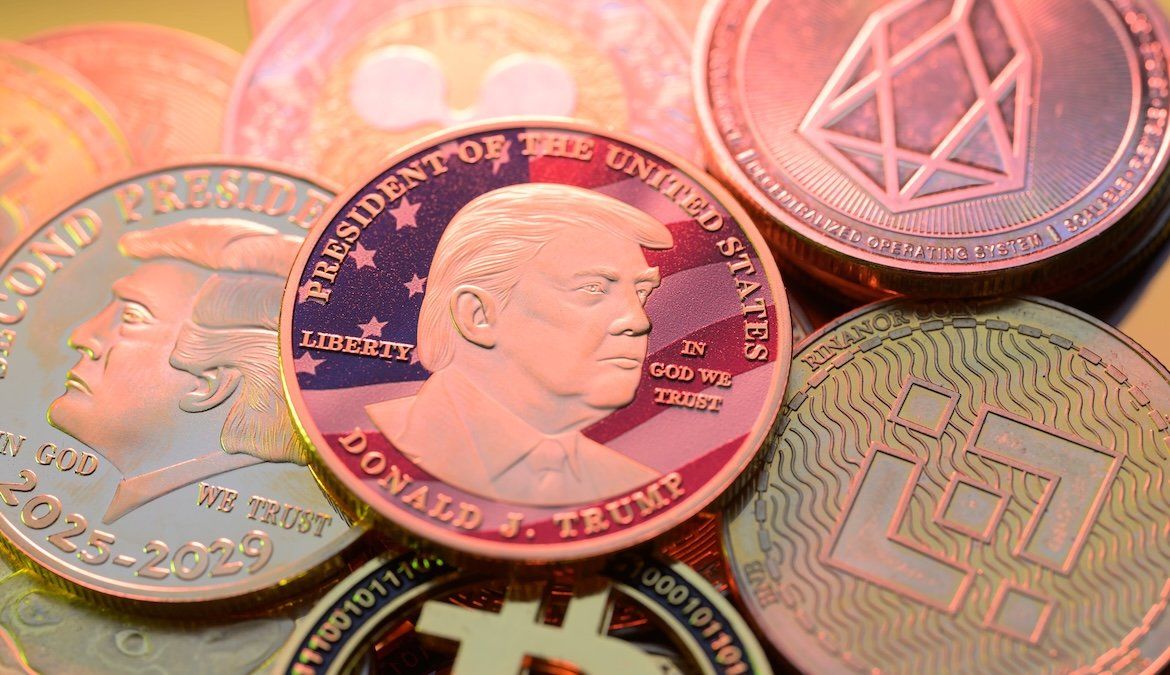Representation of the $Trump meme coin together with Bitcoin and crypto coins, seen in this photo illustration.
Though once a crypto skeptic, President Donald Trump has become an enthusiastic supporter of the industry. His media company began investing in crypto several years ago, and on the campaign trail, he pledged to reverse Joe Biden’s administration's tough regulatory approach toward this asset class. He also proposed creating a national Bitcoin stockpile, which would include the Bitcoin seized in law enforcement actions.
Trump’s recent announcement of a “strategic crypto reserve” showed his continued commitment to this idea, as well as his indifference to perceptions of conflicts of interest. Crypto-friendly investors are influential in the new administration, and Trump himself launched a crypto meme coin shortly before taking office.
We asked Eurasia Group expert Babak Minovi how a “strategic crypto reserve” would work.
What do you think the reserve’s purpose would be?
The name implies it would be similar to the Strategic Petroleum Reserve, the 400 million barrels of crude oil the US holds in reserve to supply the country in the event of a disruption. This reserve has also been occasionally used to smooth out the price of oil, most recently with sales in 2020 and 2021 to help moderate post-pandemic price increases. Yet is unclear that crypto is a similarly strategic asset for the US.
Countries also hold other types of assets – usually gold and so-called hard currencies (currencies such as the US dollar that serve as a stable store of value) – for use during times of economic or financial crisis. The US dollar’s status as a global reserve currency allows the US to hold much smaller foreign exchange reserves than the size of its economy would indicate. The US currently has about $1 trillion in reserves, including about $750 billion in gold. In comparison, China has reserves of about $3.2 trillion.
Although speculative assets such as stocks or crypto are generally not included in reserves, allocating some of the US’s reserves to crypto could also be a policy objective of the administration.
What would the reserve mean for the crypto industry?
Given that crypto trading volumes have been around $0.5 trillion a day, it is highly unlikely that any reserve buying envisioned under existing norms would be of sufficient magnitude to affect crypto prices. However, the US Treasury's stamp of approval on crypto as a reserve asset would probably affect market sentiment positively, especially in the short term, by convincing more conservative investors to allocate to the asset class.
There is also the possibility that the US's entry into the crypto reserve bloc could encourage other countries to add crypto assets to their government coffers. El Salvador is another country that has allocated some of its reserves to crypto (though the practice has prompted stern warnings from the International Monetary Fund).
Do you think this is a feasible proposal that is likely to go ahead?
It's hard to say that anything is not feasible these days, given some of the administration’s unexpected early actions, but the wisdom of such a move is questionable. The current downward trend in crypto prices is not outside of historical norms, and its value could sink much more. The relative opacity of the crypto market could also leave these assets more vulnerable to bad actor manipulation, potentially causing ripple effects in financial markets.
Why do you think Trump is advancing this idea and is so bullish on crypto generally?
Though Trump was once dismissive of crypto – he said in 2019 that Bitcoin “was based on thin air” – he later shifted his stance. His deregulatory instincts probably played a role in this shift, as did the influence of people in his orbit. Close advisers such as Elon Musk, Commerce Secretary Howard Lutnick, and Treasury Secretary Scott Bessent – plus some family members – are crypto bulls. Trump’s media company has been dabbling in crypto investments for some time, and his recent experience with the $TRUMP meme coin probably reinforced the idea of crypto’s money-making potential in the president’s mind.
The Biden administration, conversely, took a tough regulatory stance toward crypto – why do you think that is?
In a way, regulators’ concerns with crypto mirror those about any other tradeable asset. Regulators need to be able to establish ownership and price and make sure that investors aren’t swindled by false claims and fraud. The existing regulatory systems have been put in place to ensure the strength and stability of the system for stocks, bonds, foreign exchange, and commodities. A desire to extend that umbrella to crypto – a relatively new asset class – explains most of the tough stance of the previous administration.
Edited by Jonathan House, senior editor at Eurasia Group.
